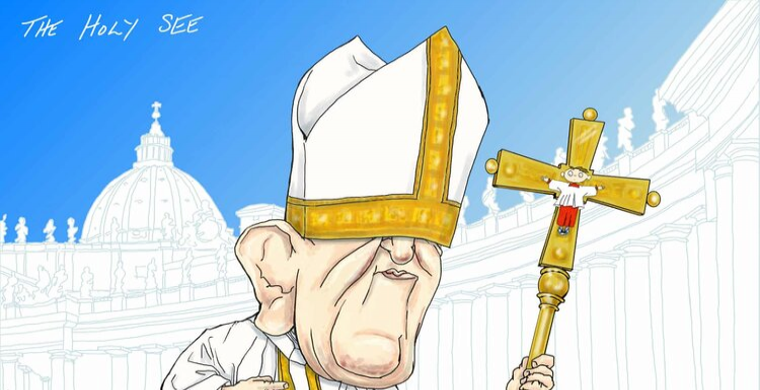CHOOSE A POPE
Nicola Jennings illustration
By Chuck Collins
https://www.anglicanism.info/
June 5, 2021
There were many "causes" of the sixteenth century Protestant Reformation, but certainly one was that people generally lost patience with the corruption of papal authority. Some notable scholars began to openly criticize the popes (e.g. John Wycliffe 1320-1384 and his followers the Lollards, and Erasmus of Rotterdam 1466-1536 In Praise of Folly). In the years leading up to Martin Luther, the Catholic Church had three rival popes - at the same time. At the ecumenical council of Pisa held June 5, 1409 an attempt was made to end the Western Schism by deposing Popes Gregory XII (Rome) and Benedict XIII (Avignon) because they were notorious: "notorious schismatics, promoters of schism, and notorious heretics, errant from the faith, and guilty of the notorious and enormous crimes of perjury and violated oaths." The solution worked out by the Cardinals was to elect a third pope, Alexander V. Western Catholicism was then divided into parties with separate popes until the Council of Constance (1414-1418) which then forced the competing popes to resign in favor of one pope: Martin V. It was at the first Vatican Council in 1870, that the Roman Catholic Church formally declared that popes are infallible in matters of faith and morals.
Protestants do not find the primacy-of-Peter in the Bible, neither do we recognize a centralized authority with permission to mix biblical and unbiblical teachings (magisterium) to instruct Christians about what to believe. The Protestant Reformation was based on the Bible at our primary authority (sola Scriptura), what Alister McGrath calls "Christianity's Dangerous Idea." God appointed the Bible as the sole instrument through which he reveals the way of salvation to the church, which means that "the biblical text would have to be sufficiently comprehensive and sufficiently self-explanatory, under the inspiration of the Holy Spirit, to effect this purpose. If such were the case, the clerical leadership of the church would then derive their authority from the degree of their faithfulness to Scripture's saving teachings and not the other way around" (Ashley Null, "Thomas Cranmer and the Anglican Way of Reading Scripture").
"Let us diligently search for the well of life in the books of the New and Old Testament, and not run to the stinking puddles of men's traditions, devised by man's imagination for our justification and salvation. " -- Thomas Cranmer, Homily on "Holy Scripture"
"Holy Scripture containeth all things necessary to salvation: so that whatsoever is not read therein, nor may be proved thereby, is not to be required of any man, that it should be believed as an article of Faith, or be thought requisite or necessary to salvation." -- Thirty-nine Articles of Religion, VI
". . .so also the Church of Rome hath erred, not only in their living and manner of Ceremonies, but also in matters of Faith." -- Thirty-nine Articles of Religion, XIX
________________________________________
Christianity's Dangerous Idea: The Protestant Revolution, Alister McGrath
Reformation Anglicanism: A Vision for Today's Global Communion, Ed. Ashley Null & John Yates III














